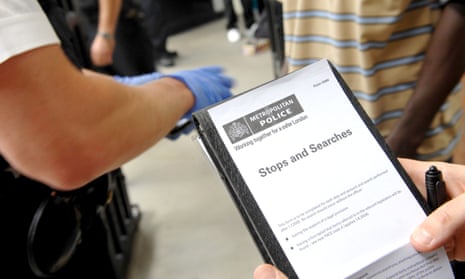Suella Braverman has called on police to increase the use of stop and search powers “to prevent violence and save more lives”.
In a statement aimed at all 43 forces in England and Wales, the home secretary said officers who used the powers had her “full support”.
Her comments are likely to alarm critics of stop and search who point out that the technique disproportionately targets black and minority ethnic communities.
Government statistics suggest black people are seven times more like to be stopped and searched compared with white people. Campaign groups have previously said relaxing restrictions on police use of stop and search could compound discrimination.
In remarks that appear to be aimed at addressing anticipated criticism, Braverman said young black males were disproportionately affected by knife crime.
Her statement says: “Carrying weapons is a scourge on our society, and anyone doing so is risking their own lives as well as the lives of those around them. This dangerous culture must be brought to a stop.
“My first priority is to keep the public safe, and people who insist on carrying a weapon must know that there will be consequences. The police have my full support to ramp up the use of stop and search, wherever necessary, to prevent violence and save more lives.”
Braverman’s statement expresses backing for the police in tackling knife crime among young black males. “Every death from knife crime is a tragedy,” she says. “That’s why I also back the police in tackling this blight in communities which are disproportionately affected, such as among young black males. We need to do everything in our power to crack down on this violence.”
Earlier this month, the head of the police inspectorate in England and Wales, Andy Cooke, acknowledged that the use of stop and search “polarises the public”. But in his first state of policing report, he insisted that stop and search was an effective way of deterring crime and showing police visibility on the street.
He said police leaders should explain why it had been used disproportionally against black people. Launching the report, he said: “That doesn’t mean that the police are being racist … There’s also more disproportionality for victims. It is four times more likely as a black man to be murdered than a young white man.”
after newsletter promotion
The inspectorates audited 8,902 stop and search records in 2020 and 2021 and found that 83.9% were reasonable. But it said the overall figures masked considerable differences between forces.
Cooke called for new research to assess the deterrent value of stop and search and the causes of disproportionality in its use.
